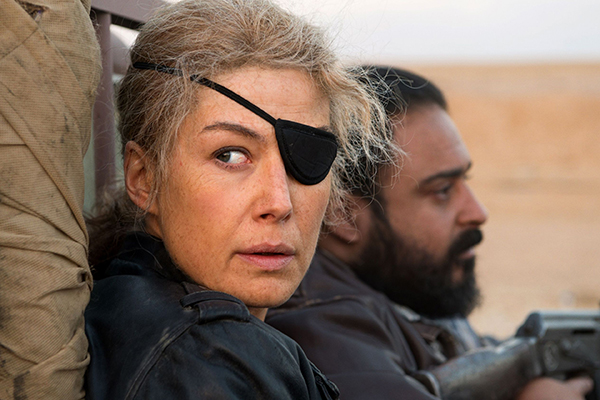
'A Private War' Demands and Delivers
By Martha K. Baker
Marie Colvin was an award-winning war correspondent, who lost an eye covering the early-2000’s conflict in Sri Lanka. Later, she lost her life in Syria. She was the stuff of legends -- pulling stories out of people whose lives were threatened by violence; ducking bullets; remaining loyal to friends and lovers, all while meeting deadlines.
‘A Private War’ tells part of Colvin’s story, searingly and keenly. She gives lie to the idea of journalists being “enemies of the people,” for she reported on true enemies. The film covers her career from 1986 until her death in 2012, when she was killed in Homs, Syria. In a speech accepting the 2001 award for War Correspondent of the Year, she explains that she “cared enough to go to these places and cared enough to write about it.”
Rosamund Pike, so effective in ‘A United Kingdom,’ ‘Hostiles,’ and ‘Gone Girl,’ brings Colvin’s brilliant words to life in voice-overs. Pike becomes Colvin. She reveals the journalist’s PTSD and subsequent stay in a hospital, unabashedly exhibits her appetites for sex and alcohol, and elevates speculation as to whether or not she’s just plain nuts. Pike is well-balanced by Tom Hollander, playing Colvin’s editor at ‘The Sunday Times,’ Jamie Dornan as her photographer and Stanley Tucci as the husband she left behind.
The other co-star of ‘A Private War’ is the camera, under the direction of Matthew Heineman, who produced such award-winning documentaries as ‘Cartel Land’ and ‘City of Ghosts.’ The experience shows in a film where panoramic shots of interminable deserts contrast with closeups of trysts and triage.
In the shadows, always, is Colvin’s hero, Martha Gellhorn, a St. Louisan who made her name as a war correspondent in the 1930’s. ‘A Private War’ will leave viewers with Post-Cinematic Stress Disorder. War will do that.


